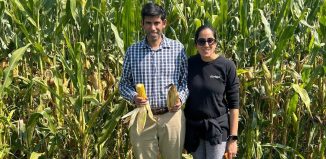Stony Brook’s Cao looks to stop cancer from spreading
Defeating a deadly enemy requires preventing that killer from traveling to key areas and wreaking irreversible damage. Stony Brook’s Jian Cao, an associate professor in the Department of Medicine, is seeking ways to prevent the enemy, in this case cancer, from making its deadly journey through the body.
Recognized for ground-breaking work he did in Japan, Cao has focused on understanding how to stop a tissue-degrading enzyme called matrix mettalloproteinases, or MMP.
“Understanding the scientific basis for metastasis has been the most challenging aspect of cancer research,” said Stanley Zucker, a professor emeritus in the Department of Medicine at Stony Brook who has collaborated with Cao for close to two decades. “No one has yet figured out a treatment that specifically interferes with the metastatic process.”
Cao, who was born in China and trained with a renowned Japanese biologist, Motoharu Seiki, explained that scientists have focused their attention on disrupting the catalytic site, the place where the MMP breaks apart cell-cell adhesion molecules.
Clinical trials of an inhibitor or blocker for that site failed because of a lack of selectivity. He now focuses on a different area, called a hemopexin domain, that is required for enhanced cell migration. He has developed inhibitors targeting different MMPs.
“We have identified the region that is required for MMP-mediated cell migration, then, we developed inhibitors to target this region,” he said. “We found or developed regions that specifically interfere” with their signaling pathway that leads to enhanced cell migration.
He uses a small protein and synthetic compounds that don’t destroy the enzyme, but rather render it ineffective in spreading cancer.
There are 25 forms of MMP. For breast cancer, for example, MMP-14 activates MMP-2, which activates MMP-9. Based on other research, all these MMP’s play an important role in breast cancer metastasis, Cao said. “We identified regions that are required for enhanced cell migration that are specific and selective for each MMP,” he said.
Cao said his work has generated attention from pharmaceutical companies that are hoping to develop treatments for metastatic forms of cancer. A company reached out to him recently because they “want to collaborate to license our inhibitors,” he said.
Cao’s scientific peers lauded his results and his approach. “Many top investigators in the field consider Dr. Cao to be the best scientist to have entered the rapidly expanding field of MMPs in the past 20 years,” said Zucker. “Dr. Cao gained worldwide recognition for his research contributions to Dr. Seiki’s laboratory in Japan.”
In addition to working with these MMP inhibitors, Cao also has a three-dimensional drug screening test. Cao looks to see whether drugs that might be approved for other uses might have anti-cancer properties. The National Institute of Health’s National Center for Advanced Translational Sciences created a program aimed at repurposing old drugs for new uses. He has seen some benefit from a psychiatric drug that can interfere with cell migration and can inhibit cancer invasion.
At the recent 2014 Gloria and Mark Snyder Symposium for Cancer Medicine, Cao presented his research on a gene he cloned, called CeMIP, that is normally expressed in the central nervous system.
After analyzing thousands of patients, he found that people who have a high level of this gene have a shorter survival period with breast cancer. Those with less of this gene survive longer.
Knocking out this gene in highly aggressive breast cancer in animal models causes cancers to become less invasive.
He is studying a promoter region of this gene that selectively hits the on switch. He hopes to develop a compound that interferes with the CeMIP protein.
A resident of South Setauket, Cao lives with his wife, Qiang Zhao, who is also a scientist working on cancer at Stony Brook, and their 16-year-old son Kevin.
His work often includes going to the lab seven days a week. Cao is “the hardest working scientist I’ve ever encountered,” said Zucker.
“His productivity is outstanding in terms of publication and new research grants.”
Cao believes he is on the right track to develop possible treatments to battle cancer as it spreads. “If you can stop the invasion,” he said, “you can prevent metastasis.”






